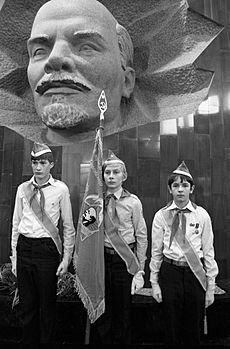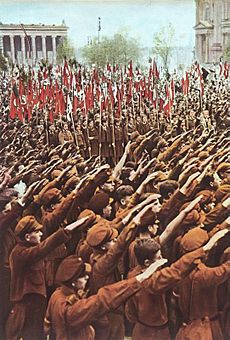Indoctrination facts for kids
Indoctrination is when someone teaches a person ideas or beliefs in a way that makes them accept those ideas without questioning them. It's like being taught something so strongly that you don't think about whether it's true or not.
Humans are social beings, and we learn a lot from our families and the people around us. This means some amount of teaching and sharing values happens naturally. This helps create strong communities where people share similar ideas.
It can be tricky to tell the difference between regular education and indoctrination. Education usually encourages you to think for yourself and ask questions. Indoctrination, however, often expects you to simply accept what you're taught. Because of this, the word "indoctrination" often has a negative meaning. It's often used when talking about strong political views or religious beliefs. The word "endoctrinate" first appeared in the 1620s, meaning "to teach." It gained its current meaning of "teaching ideas without questioning" around the 1830s.
Indoctrination is similar to socialization. Socialization is the process of learning how to behave in society. But "indoctrination" usually suggests a more forced or one-sided way of teaching.
Contents
Indoctrination in Politics

In politics, indoctrination is sometimes seen as a way for governments or powerful groups to keep things the way they are. They might use public schools or other state organizations to spread certain ideas. This can make people accept the government's views without much thought.
For example, in his famous book Nineteen Eighty-Four, George Orwell wrote about how totalitarian governments use propaganda. Totalitarian governments control almost every part of people's lives. They use strong messages to make everyone believe the same things. People sometimes debate if other types of governments also use indoctrination, but in less obvious ways.
Indoctrination in Religion
Religious indoctrination is about teaching the beliefs and rules of a religion. Many religious groups teach new members about their faith. However, they usually don't call it "indoctrination" themselves because of the negative meaning the word has.
Some people use the term "indoctrination" negatively to suggest that religions force people to think a certain way. Critics sometimes argue that children of religious parents are unfairly indoctrinated. This is especially true in cases of religious extremism, where beliefs are very strict and don't allow for other ideas.
However, indoctrination can also happen in non-religious settings. For instance, in the 20th century, countries like Albania and the Soviet Union had programs to teach people to be atheists. State atheism means the government officially promotes not believing in any religion. In these countries, children were taught from a young age to reject religion. They were even encouraged to report parents who practiced religion at home.
After the Soviet Union ended, Russia passed a law in 1997. This law recognized that religion, especially Orthodox Christianity, was important to Russian history.
Indoctrination in the Military
The first psychological training soldiers receive is sometimes called indoctrination. This helps prepare them mentally for their duties. This use of the word is not usually seen as negative.
Indoctrination and Secret Information
In the world of information security, indoctrination refers to the first instructions given to someone. This happens before they are allowed to see secret information. It makes sure they understand the rules for handling sensitive data.
See also
 In Spanish: Adoctrinamiento para niños
In Spanish: Adoctrinamiento para niños
- Acculturation
- Behavior modification
- Brainwashing
- Ideology
- Groupthink
 | Sharif Bey |
 | Hale Woodruff |
 | Richmond Barthé |
 | Purvis Young |



